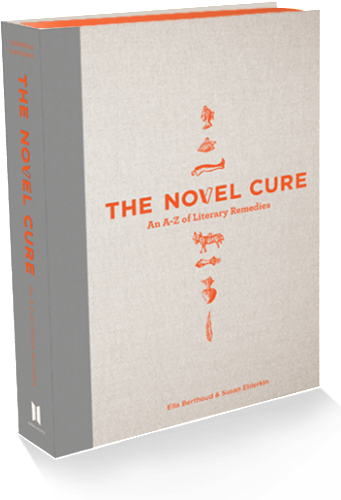 Reviewed in this essay: The Novel Cure by Ella Berthoud and Susan Elderkin (Canongate, 2013)
Reviewed in this essay: The Novel Cure by Ella Berthoud and Susan Elderkin (Canongate, 2013)
As 2014 commences and with it our lists of things to do and things to do better, here is a self-help book of a different sort. Berthoud and Elderkin have compiled a medical handbook for those who prefer to ease their aches and pains with stories rather than stethoscopes. The authors promise an apothecary stocked with “Balzacian balms and Tolstoyan tourniquets, the salves of Saramago and the purges of Perec and Proust.” They promise, and they deliver.
It is bibliotherapy for the twenty-first century. Berthoud and Elderkin do not make a distinction between pain of the body and malaise of the soul; both mental and physical life can equally be helped by a good read. Thanks to this approach, The Novel Cure can be your recourse should you have a bad back, road rage or that Monday-morning feeling. It is also simply fun to open at random. I’m not suffering from carsickness at the moment, but next time I will be prepared. Or perhaps, as the book advises, I will abandon the car and take the train instead, enjoying as I go the ten best novels to read on a train.
There are many such situation-specific lists interspersed within this book. They range from the general, aforementioned, train-type to the quirkily precise. There are ten best novels for duvet days, ten best to cure the xenophobic, ten best to turn your partner on to fiction and ten best to read when you’re locked out. And audio books are not excluded; there is a separate list for them and also one on audio books for road rage. There is also a ten-best list for each decade of life, ranging from the teens to the 100s.
Berthoud and Elderkin are clearly dedicated to literature. Since 2008, the two women have been running their bibliotherapy service through The School of Life in London. The Novel Cure is their first joint publication. The friends and colleagues met at Cambridge University where they were both students of English literature, and their bibliophile nature is perhaps most obviously illustrated by the cluster of book-related ailments their work addresses. If you never seem to have enough time to read, never finish what you do read or if you are constantly seduced by new books, help can be found here. The two firmly believe that words can mend, whether by providing the solace that you are not alone, a distraction, or an actual change of heart.
The Novel Cure is a more precise and comprehensive version of what many people already do, namely recommend books to friends who may be undergoing difficulties of some nature. The authors manage to successfully thread between entries that are humorous and those that demand a serious and sympathetic tone. And their writing is consistently compassionate. Cancer, both from the perspective of a caregiver and those undergoing treatment, is addressed and the entry on dying is a beautifully composed quiet armour of comfort.
At times the maladies tackled within the work seem randomly specific, such as “determinedly chasing after a woman even when she is a nun” (read Skin of a Lion by Ondaatje). You may disagree with Berthoud and Elderkin’s choice of recommended books or their omission altogether of a beloved author. Some of my favourite writers and novels were nowhere to be found. This work engages the reader, however, and part of the joy of this compilation comes from sparring with it. This is above all a book that will make you think about what and why you read, and perhaps along the way you can cure that toothache.
